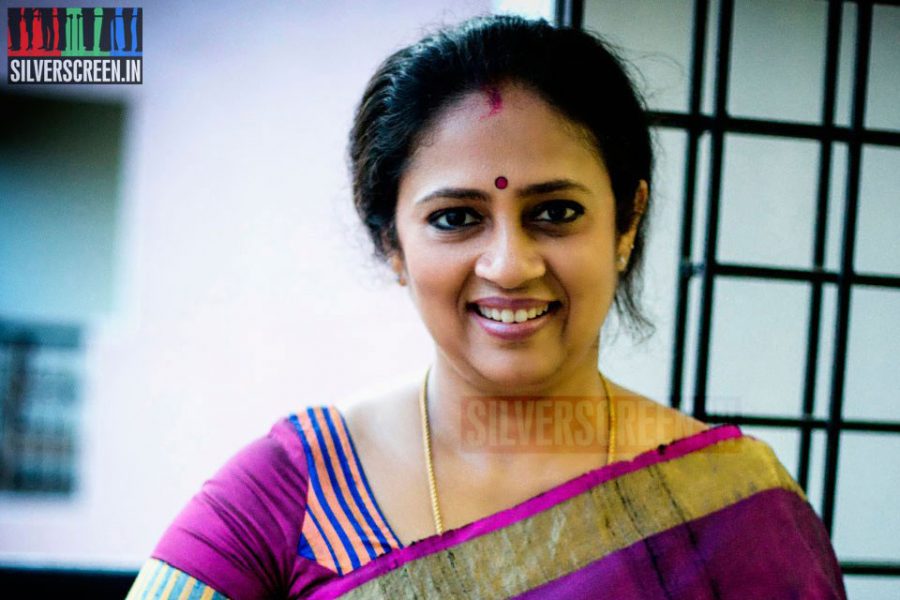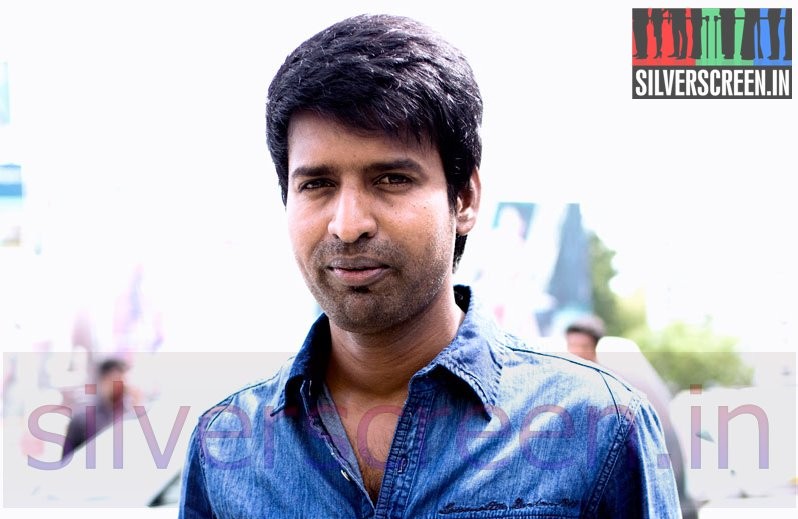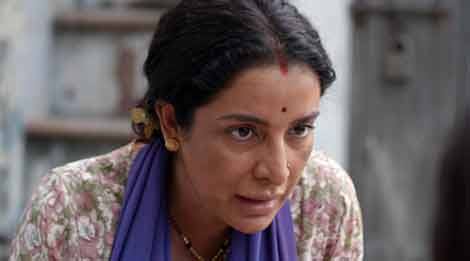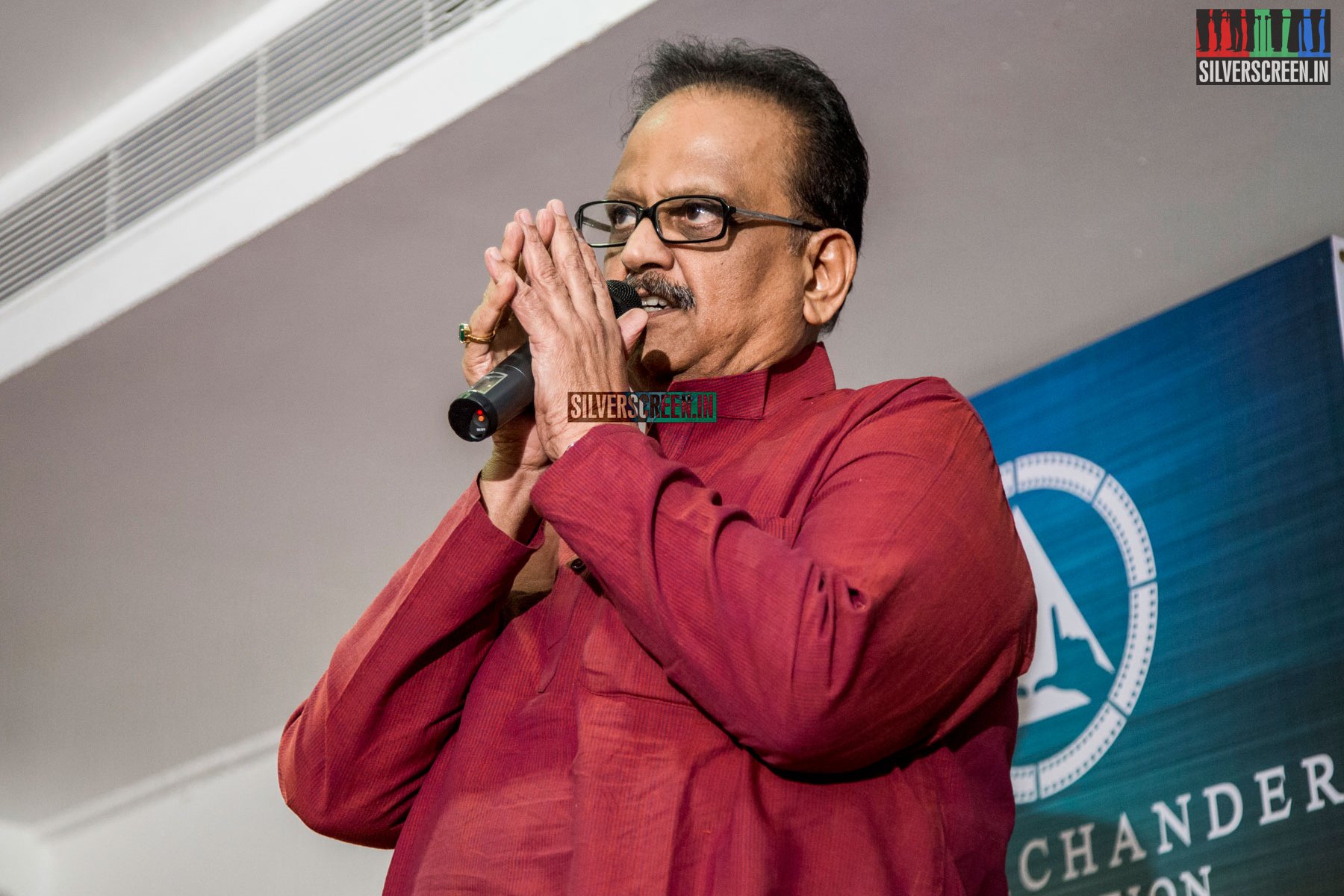Lakshmy Ramakrishnan breezes into her Porur apartment wearing a purple silk-cotton sari and a gorgeous smile.
The room lights up instantly.
There’s something warm and maternal about Lakshmy; it’s like meeting a favourite aunt after a long time. There are no uneasy silences, no uncomfortable conversation starters.
Her cheeks dimple delightfully as we talk, and I am seized by this insane urge to sit next to her, and talk about my day.
Lakshmy’s drawing room is also quite like her. Minimalist and elegant, an antique wall hanging here and a quaint little bookshelf there.
Also, a number of Ganesha murthis.
Lakshmy is bewitched by cinema. The endless creative and emotional journey that it is. She calls it “liberating,” because “difficult roads lead to beautiful destinations.” Prod her a little about her second directorial venture, Nerungi Vaa Muthamidathe and her eyes sparkle. Like a child inside a toy shop. “It’s a travel movie in the backdrop of a petrol crisis. I wanted to see if I could make a commercially viable film.”
It’s also diametrically different from her debut film, Aarohanam (2012) – that dealt with bipolar disorder. But having said that, her tale will retain what she’s known for. Subtlety. Nothing too dramatic; a light-hearted narrative with four intense stories weaved together.
Lakshmy lends a philosophical angle to it. “Unless we are faced with a crisis, we never realise the value of things,” she says. “Be it relationships or natural resources. We abuse them. That’s the idea. The movie will make you think.” There’s also crime and thrill and family conflicts. But in a never-before-seen fashion.
The script was written for a star, of course. Lakshmy wistfully admits that the movie would have been more bankable with a star in the lead. But then, she didn’t have the patience to wait for their dates.
Such films should be made soon, she declares.
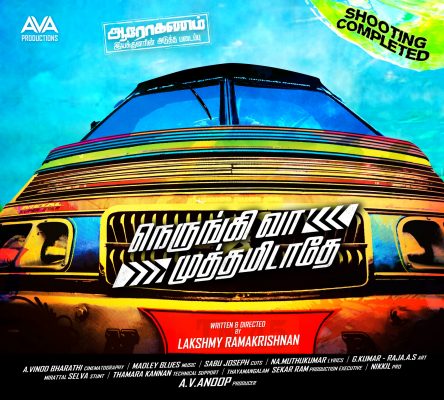
Nerungi Vaa Muthamidathe Movie Posters Directed by Lakshmy Ramakrishnan
When I mention the title of the movie, she dimples. “I found it written at the back of a lorry. Title kekkumpodhu, ellarum solluvaanga, ‘idhu oru kavarchi Malayalam bit padam maathiri theriyudhe’ nu. Epdi react panrathunney therile. But the lorry is another important character in the film.”
Nonetheless, Lakshmy admits to feeling extremely nervous and doubtful about the movie. “It was a beautiful experience. Anything more is a bonus as I am not a trained filmmaker. I have tried something else, let’s see,” she shrugs, and adds as an afterthought, “So what if I fail miserably? What will happen? Why should I prove myself? I have come this far, and that is something.”
She recalls what Malayalam director Blessy once told her, “Don’t set standards for yourself. If one movie doesn’t click, you make another one – simple as that. Let them talk.” I want to approach it that way. I find there are some wonderful moments in the film personally.”
She is baffled by the “feminist filmmaker” tag that she had acquired after her debut film. “It is not a woman-oriented film,” she says, “Being a woman, I had probably found a different perspective to the gender. That’s it.” But she is careful to not let such labels get the better of her. She likes to self-evaluate, and it had always helped the filmmaker in her.
NVM was shot in 45 locations. Every scene had a different tint. The challenge was to find empty roads. And, the movie was shot in peak summer. There is also a crucial sequence shot in mid sea that left Lakshmy sea-sick.
As a filmmaker, she has come out richer from the experience, having keenly followed the technical aspects of cinematography. Lensing, steady cam, fly cam, tilt-shift, telephoto lenses – you name it – she learnt it.
[quote align=’left’]If one movie doesn’t click, you make another one – simple as that. [/quote]Are the audience tougher to please of-late? That’s fine, she declares. “Somewhere down the line, their tastes are influenced by what we give them.” It saddens her, but she’s hopeful that cinema will only get better from here. After Jigarthanda, she wanted to party inside a well. Bobby Simha’s clothes were annoying, Lakshmy wrinkles her nose, but she loved the film. She wants to make movies like Naduvule Konjam Pakkatha Kaanom and Soodhu Kavvum. “They are trend-setters. I want to be as updated as them. Make young films.”
[quote align=’left’] Title kekkumpodhu, ellarum solluvaanga, ‘idhu oru kavarchi Malayalam bit padam maathiri theriyudhe’ nu. [/quote]Until she turned 25, Lakshmy wasn’t allowed to watch too many movies. The ones that she did watch happened to be Guruvayoorappan and Swami Ayyappan. She vividly recalls the first movie that her parents took her to – by mistake though. It was Mundhanai Mudichu. Her mother went ballistic. “Kozhanthaigal paakara film illa!” she had screeched.
Also, being the youngest in a family of six was never easy. There was this constant need for approval, an identity crisis of sorts. She was trying to find herself in the midst of it all. Post wedding, daughters, and a long period as an Event Manager in the Middle East, she came back to Chennai. “I thought I will be a proper housewife, but on the second day, I started growing restless.”
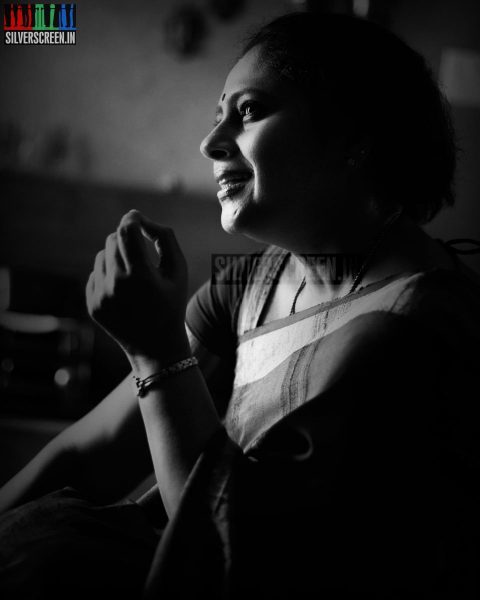
Actor Director Lakshmy Ramakrishna Exclusive Photoshoot for Silverscreen
That’s how it all started.
She had no clue about writing a script then, but was ready to learn. She would recite the dialogues and he would write. They wrote around 60 scenes.
Lakshmy made seven short films after that. They were telecast on various regional channels and made money.
Another day, Malayalam film director Lohitadas landed up at her house. He wanted to shoot a film there as well. And in addition, she was offered a meaty role in his next Malayalam film, Chakkaramuthu. “I was surprised,” Lakshmy says, “after 40, when something came up, I had the courage to say, ‘I want to do it’. It was not easy to convince my family, but I somehow did. I signed 15 films at once.”
Not that there was a dearth of film offers earlier. When she was around 18 – and married – she was accosted thrice at Woodlands Drive by prominent film directors.
Even on her honeymoon, Lakshmy recalls laughing, she was offered a movie.
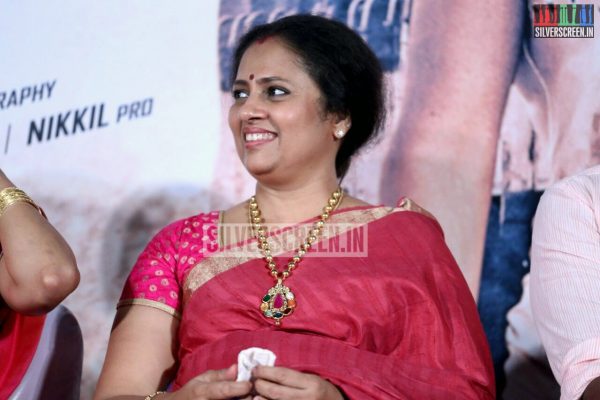
Actress Lakshmy Ramakrishnan at Nerungi Vaa Muthamidathe Press Meet Event
But that also made her realise the excess attention that we pay to one’s appearance. “It shouldn’t be the focus,” Lakshmy says, “look good for your own sake. We are conditioned to use our body and beauty as tools. High time we stopped doing it.”
And, Mysskin turned out to be a wonderful friend. He’s like a child, Lakshmy declares, someone who doesn’t think or weigh words before speaking. She recalls carrying a girl during the filming, her back was hurting a lot. But Mysskin wanted another take. When she protested, he told her, “To me, you are an actress, not a woman.” I liked that about him, she says.
Mysskin surprised her further when he began bawling like a baby after a midnight shot. She was standing in the middle of the road. And a man had stopped his vehicle to solicit.
Naan ungaley indha maathirellam panna vechittene, Mysskin had cried.
On the sets, Lakshmy is constantly hovering near cinematographers and directors, eager to learn the nuances of filmmaking. More than books, she loves the learning on sets.
Photography is a huge craze. She has a video library at home. And loves capturing every important event on camera. “When my daughter was born, I used to shoot every single milestone – pallu vizhunthathilerndhu till her wedding,” beams Lakshmy, adding that her eldest daughter is into full-fledged photography these days.
A Blackmagic is her latest prized acquisition.
Gender prejudice is quite rampant in cinema, she observes. “But there’s nothing much that one can do about it.”
Being a woman in Tamil cinema has its limitations. “Yudham Sei was a one-off thing. Otherwise what do we get?” she seethes, “‘ennanga tea saapdunga’, ‘vaanga ulla vaanga’ or another standard line – ‘unga appa kitta ennada badhil solven’. Saranya’s character in VIP was different and she did a fantastic job; but otherwise, where are all those women whom we see on the road, man? Where are those women who speak their mind?”
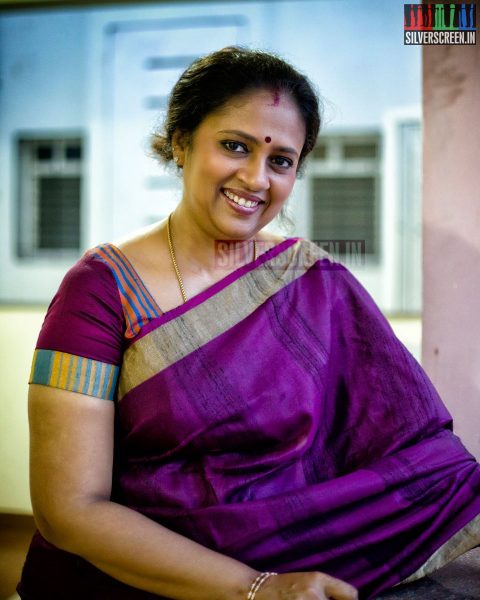
Actor Director Lakshmy Ramakrishna Exclusive Photoshoot for Silverscreen
And, is it worth it?
“I should shed around 20 kgs, get fit, and do a lead role at 50 very soon,” she grins.
But the “variety” in roles is often limited to either being Sneha’s mother, Arya’s mother, or Jiiva’s mother, Lakshmy smiles ruefully. In sharp contrast though, Malayalam cinema has a wide repertoire of character for women, she observes.
Recommended
Having said that though, cinema is quite safe for women, I am told. “It’s about how you work, the way you carry yourself, and the message you give out. It’s your prerogative. Nobody can force you to do things that you don’t want to do.”
She also thinks the day when women stop laughing, and protest at the scenes portraying them in an objectionable manner, filmmakers will stop doing them.
We talk more.
Empowering women. Harassment. Male chauvinism.
Lakshmy has an opinion about everything.
“The only way to handle a man is to speak openly and fearlessly to him. Most rapes happen because of the feeling of being superior, and not because of sexual attraction. Women need to be fearless. It’s all in the mind. We are conditioned to think that men are superior. Mothers and mothers-in-law should begin this empowerment. At home,” she adds with a touch of anger.
Lakshmy thinks Deepika Padukone nailed it when she took a stand against media encroachment. “You make them wear shorts. That’s fine. But the problem starts when you set up a low angle shot. The media has a role to play. Don’t use cinema just as an entertainment tool. Give respect, take respect.”
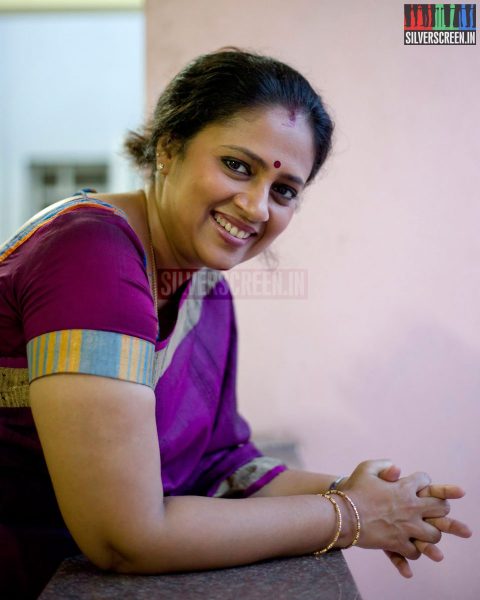
Actor Director Lakshmy Ramakrishna Exclusive Photoshoot for Silverscreen
She wants to watch more films. “Kamal sir asked me to keep watching movies, so I learn.”
All the same, Lakshmy admits, once she’s back home, things change. Priorities change.
The filmmaker in her takes a backseat.
Lakshmy is passionate, though – about life and cinema. And that remains a constant.
The Lakshmy Ramakrishnan interview is a Silverscreen Exclusive.
